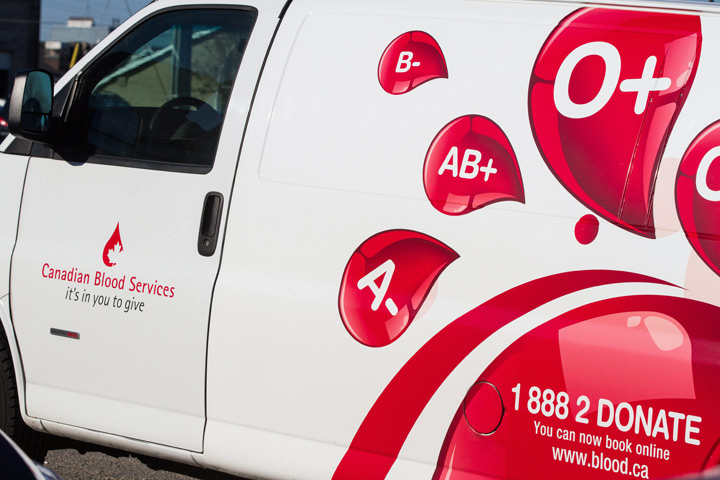Canadian Blood Services recently said that it needed 22,000 Canadians to donate blood by August 26, in order to ensure they have enough blood to meet patients’ needs for the rest of the summer.

But for many people, donating blood isn’t so easy — even if they want to.
“I’ve never personally donated blood, but a few years ago I decided to have my blood test and find out what my blood type was, and I discovered that I’m O-negative,” said Vanessa Rolheiser.
“Being O-negative, I can donate to just about everybody.”
She would like to donate, she said, but there’s nowhere near her home of Grande Prairie, Alta. to go.
“I realized all the mobile units had been removed from the Grande Prairie area,” she said.
“We have to go down to Edmonton or Calgary in order to donate blood in Alberta. That’s the only option, and that’s five hours away.”
A list of permanent donation sites on the CBS website shows that they’re mostly concentrated in large cities. The only permanent clinic in Manitoba, for example, is in Winnipeg. Nova Scotia, Newfoundland and Labrador and P.E.I. also only have one clinic each.
Searching “Grande Prairie” on the website’s find-a-clinic tool turns up zero results over the next year.
“We have almost 70,000 people that live in Grande Prairie, including our immediate area, and we service a very big area in the Peace Country. So there’s hundreds of thousands of people, if we had the ability to donate blood in Grande Prairie, people who’d be able to donate,” said Rolheiser.

Get weekly health news
WATCH: Canadian Blood Services needs donors before September long weekend

In a statement, Canadian Blood Services said it thanks rural residents for their interest in donating blood. “It is difficult for us knowing that there are people in rural communities who want to donate blood, but because of geographical distance are unable to do so. While there is strong community support throughout the country, we’re not able to accommodate all potential donors with our schedule/locations.”
Serving more remote locations sometimes isn’t possible, said the agency. Blood from mobile donation sites has to be delivered for processing within a “very tight timeframe.”
“Holding a mobile donation centre in a more remote location could impact our ability to ship the blood quickly to our manufacturing sites.”
“Logistical challenges mean we must focus on collecting blood in communities that are closer to our production sites to meet timeline requirements.”
Although Canadians outside major cities might not be able to donate, CBS wants people to know they will still receive blood at their local hospitals.
And, they want people to consider donating when they take a trip to a bigger city which has a donation clinic — something that Rolheiser said she’s considering. “I’ve started looking at filling out the questionnaires and so on so when I do go to Edmonton, I can donate blood.”
Donations from gay men
There’s another big group that wants to donate but can’t: gay men.
Right now, men who have sex with men can only donate blood if they have been celibate for at least one year. This is actually a shorter time period than it used to be: before 2016, men had to wait at least five years, and before 2013, any man who had had sex with a man even once since 1977 was ineligible to donate.
Even the current policy is often challenged by both activist groups and academics. The world-renowned HIV researcher Dr. Mark Wainberg, now deceased, told Global News in 2016 that the “science doesn’t support” a one-year ban, as screening for HIV has vastly improved since such bans were introduced.
“We certainly empathize with individuals who, for many different reasons, cannot give blood,” said Canadian Blood Services.
“We understand this policy may cause strong feelings and want to emphasize it is not intended as a negative reflection on any individual.”
The organization says it is currently involved in research to generate the evidence required “for low risk groups to be identified and included as eligible donors while maintaining the safety of the blood supply for patients.” This research could “evolve” the current eligibility criteria for men who have sex with men.
Canadian Blood Services also said that only about four per cent of eligible donors actually donate blood.


Comments
Want to discuss? Please read our Commenting Policy first.